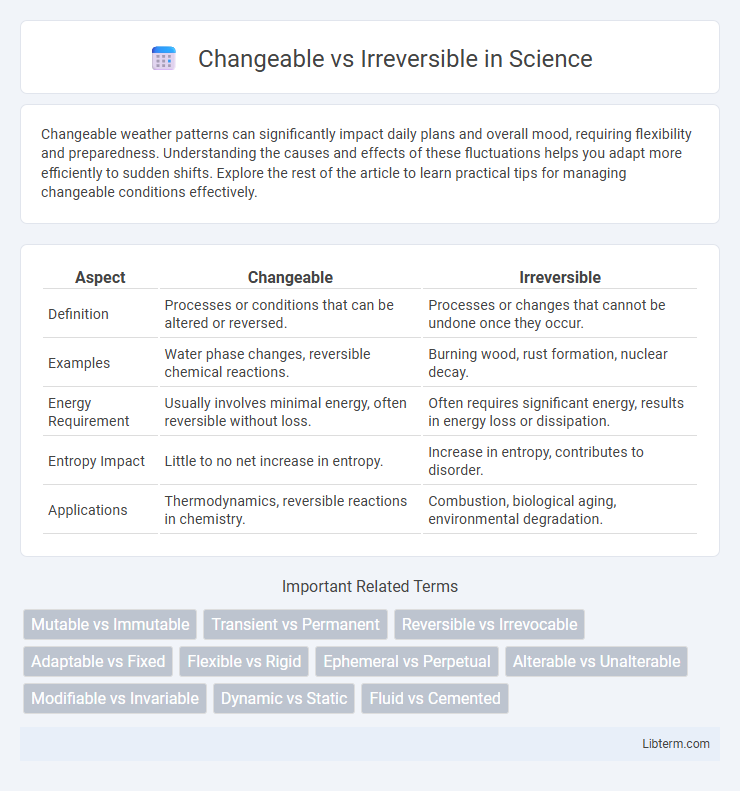Changeable weather patterns can significantly impact daily plans and overall mood, requiring flexibility and preparedness. Understanding the causes and effects of these fluctuations helps you adapt more efficiently to sudden shifts. Explore the rest of the article to learn practical tips for managing changeable conditions effectively.
Table of Comparison
| Aspect | Changeable | Irreversible |
|---|---|---|
| Definition | Processes or conditions that can be altered or reversed. | Processes or changes that cannot be undone once they occur. |
| Examples | Water phase changes, reversible chemical reactions. | Burning wood, rust formation, nuclear decay. |
| Energy Requirement | Usually involves minimal energy, often reversible without loss. | Often requires significant energy, results in energy loss or dissipation. |
| Entropy Impact | Little to no net increase in entropy. | Increase in entropy, contributes to disorder. |
| Applications | Thermodynamics, reversible reactions in chemistry. | Combustion, biological aging, environmental degradation. |
Understanding Changeable and Irreversible Concepts
Changeable concepts refer to ideas, conditions, or states that can be modified or adapted over time, allowing for flexibility and evolution in response to new information or circumstances. Irreversible concepts denote processes or changes that cannot be undone, emphasizing permanence and the lasting impact of specific actions or events. Understanding the distinction between changeable and irreversible concepts is crucial in fields such as environmental science, decision-making, and behavioral psychology, where the potential for alteration versus permanence influences strategies and outcomes.
Key Definitions: Changeable vs Irreversible
Changeable refers to processes or conditions that can be altered, reversed, or modified over time, such as temperature fluctuations or reversible chemical reactions. Irreversible denotes changes that cannot be undone or returned to their original state, exemplified by rust formation or burning paper. Understanding these key definitions is essential for distinguishing between temporary states and permanent transformations in scientific and everyday contexts.
Real-life Examples of Changeable Situations
Changeable situations often involve adaptive processes like learning new skills or improving physical fitness, where consistent effort leads to measurable progress. For instance, a student struggling with math concepts can enhance understanding through targeted practice and tutoring. Similarly, weight loss through diet and exercise exemplifies a reversible condition driven by lifestyle modifications.
Identifying Irreversible Changes
Irreversible changes involve transformations where the original substance cannot be restored, such as burning paper or rusting iron. Identifying irreversible changes requires observing permanent alterations in properties like color, texture, or composition that indicate chemical reactions have occurred. Unlike changeable changes, physical modifications like melting or dissolving do not alter the chemical identity and remain reversible under appropriate conditions.
Psychological Impact: Coping with Change
Changeable circumstances often trigger adaptive coping mechanisms, allowing individuals to regain control and reduce stress through problem-solving and positive reframing. In contrast, irreversible situations frequently lead to acceptance-based strategies, such as mindfulness and emotional regulation, to manage feelings of loss and uncertainty. Psychological resilience is strengthened by effectively distinguishing between what can be changed and what must be accepted, fostering mental well-being despite challenging life events.
Decision-Making: Weighing Flexibility and Finality
Decision-making involves evaluating the trade-offs between changeable and irreversible choices, where flexibility allows for adaptation to new information while finality provides certainty and commitment. Changeable decisions support iterative improvements and risk mitigation, especially in dynamic environments like technology development or market strategy. Irreversible decisions demand thorough analysis and confidence, as errors can lead to significant consequences in areas such as legal contracts or capital investments.
Strategies for Managing Changeable Outcomes
Effective strategies for managing changeable outcomes prioritize flexibility and continuous monitoring to adapt interventions as needed. Implementing iterative feedback loops and real-time data analysis empowers decision-makers to pivot quickly, optimizing resource allocation and improving success rates. Emphasizing proactive communication and stakeholder engagement ensures alignment and responsiveness to evolving circumstances, enhancing overall impact.
Dealing with Irreversible Consequences
Dealing with irreversible consequences requires a strategic focus on risk assessment and preventive measures to minimize damage before actions are taken. Implementing contingency plans, robust decision-making frameworks, and continuous monitoring helps manage situations where reversal is impossible. Emphasizing accountability and long-term impact evaluation supports effective handling of irreversible outcomes in critical scenarios.
Social and Cultural Perspectives on Change
Social and cultural perspectives on change distinguish between changeable elements, such as social norms and behaviors that evolve through collective action and cultural diffusion, and irreversible shifts like demographic transitions or language extinction that permanently alter societal structures. Changeable aspects often involve adaptive responses to new technologies or ideologies, allowing cultures to renegotiate identities and values over time. Irreversible changes redefine community frameworks and historical narratives, embedding themselves deeply into the social fabric with lasting impact on cultural heritage and group cohesion.
Changeable vs Irreversible: Lessons for Personal Growth
Changeable challenges present opportunities for personal growth through adaptable strategies and mindset shifts, allowing individuals to learn and improve continuously. Irreversible events require acceptance and resilience, teaching valuable lessons about coping with unavoidable outcomes and fostering emotional strength. Understanding the distinction between changeable and irreversible circumstances enables more effective decision-making and promotes healthier psychological development.
Changeable Infographic

 libterm.com
libterm.com